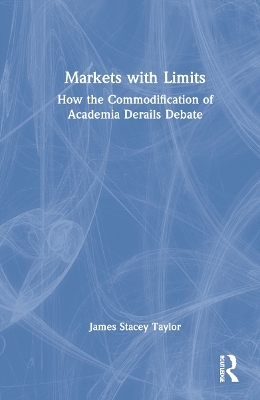
Markets with Limits
Routledge (Verlag)
978-1-032-17149-4 (ISBN)
In Markets with Limits James Stacey Taylor argues that current debates over the moral limits of markets have derailed. He argues that they focus on a market-critical position that almost nobody holds: That certain goods and services can be freely given away but should never be bought or sold. And he argues that they focus on a type of argument for this position that there is reason to believe that nobody holds: That trade in certain goods or services is wrongful solely because of what it would communicate.
Taylor puts the debates over the moral limits of markets back on track. He develops a taxonomy of the positions that are actually held by critics of markets, and clarifies the role played in current moral and political philosophy by arguments that justify (or condemn) certain actions owing in part to what they communicate. Taylor argues that the debates have derailed because they were conducted in accord with market, rather than academic, norms—and that this demonstrates that market thinking should not govern academic research. Markets with Limits concludes with suggestions as to how to encourage academics to conduct research in accord with academic norms and hence improve its quality.
Key features
Provides original suggestions concerning how to improve the exegetical quality of academic research
Systematically identifies the primary exegetical errors—and the ways in which these errors have adversely influenced current debates—that Jason Brennan and Peter Jaworski made in their influential book, Markets Without Limits
Argues that despite the current, widespread view that semiotic objections to markets are widespread in the literature, they are in actuality rare to nonexistent
Offers an up-to-date taxonomy of the current arguments in the various debates over both the ontological and the moral limits of markets
Provides an extensive overview of mistaken claims that have been made and propagated in various academic literatures
James Stacey Taylor is Professor of Philosophy at The College of New Jersey, USA. He is the author of Death, Posthumous Harm, and Bioethics (2012), Practical Autonomy and Bioethics (2009), and Stakes and Kidneys: Why Markets in Human Body Parts Are Morally Imperative (2005), and is the editor of The Metaphysics and Ethics of Death (2013) and Personal Autonomy: New Essays on Personal Autonomy and its Role in Contemporary Moral Philosophy (2005).
Introduction 1. The Magical Asymmetry Thesis 2. Semiotic Objections to Markets 3. Sandel, Semiotics, and Money-Based Exchange 4. Sex, Surrogacy, Semiotics, and Spheres: Anderson on Market Exchange 5. Walzer, Satz, Archard and Semiotics 6. Expressivist Arguments 7. What We Talk About When We Talk About the Limits of Markets 8. Why Good Academics Produce Bad Research: Academic Incentives, Woozles, and Hoaxes 9. Market Norms and Academic Norms 10. The Theory and Practice of Changing Norms Conclusion
| Erscheinungsdatum | 08.03.2022 |
|---|---|
| Verlagsort | London |
| Sprache | englisch |
| Maße | 152 x 229 mm |
| Gewicht | 444 g |
| Themenwelt | Geisteswissenschaften ► Philosophie ► Ethik |
| Sozialwissenschaften ► Politik / Verwaltung | |
| Wirtschaft ► Allgemeines / Lexika | |
| Wirtschaft ► Volkswirtschaftslehre | |
| ISBN-10 | 1-032-17149-9 / 1032171499 |
| ISBN-13 | 978-1-032-17149-4 / 9781032171494 |
| Zustand | Neuware |
| Informationen gemäß Produktsicherheitsverordnung (GPSR) | |
| Haben Sie eine Frage zum Produkt? |
aus dem Bereich


